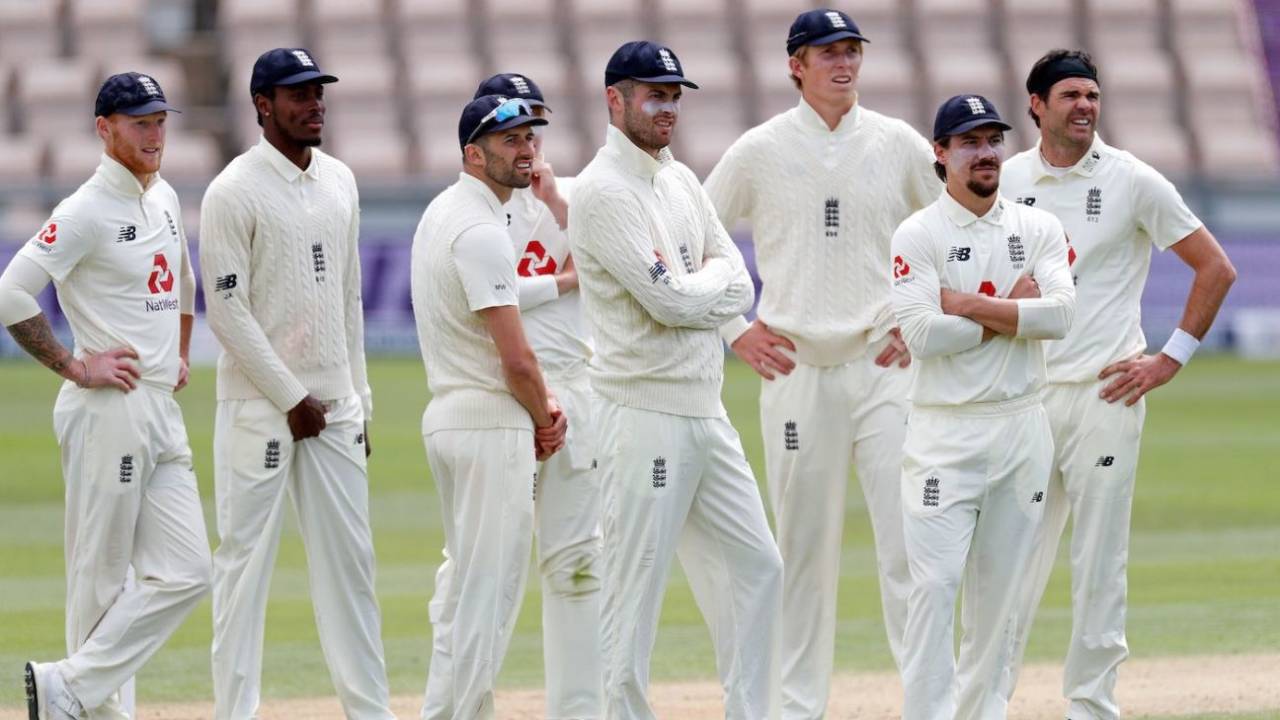It's time the DRS got an overhaul
Umpiring decisions should be taken out of players' hands and should not be part of cricket's tactical battles
Ian Chappell
19-Jul-2020
On the second day of the first Test between England and West Indies, five lbw decisions by the umpires were overturned by DRS • AFP
There was a time when the BCCI distrusted the DRS. I'm no longer in lock-step with the BCCI on this because I still don't have much faith in the DRS.
It struggles to achieve at least two of the ICC's prime objectives: arriving at the correct decision and eradicating the howler. So long as there are a finite number of reviews, it can never be guaranteed to achieve those goals. In its current form it's mostly used to review 50/50 decisions, is occasionally employed as a tactic, and is overused in the interests of self-preservation.
Umpiring decisions should never be part of cricket's tactical battles.
Fifty/fifty decisions always have been and always will be accepted by cricketers. Both batsmen and bowlers know that one day they go for you and on another day they go against you. The players accept those odds.
What does cause animosity between players is when a poor decision affects the result of a match. That's when words are exchanged, resulting in distrust and anger between players on opposing teams.
If the system had been subjected to a thorough examination before it was implemented, then there should have been a red flag next to players initiating reviews. When cricketers are playing for their living, self-preservation is often the No. 1 priority. As former Australian prime minister Paul Keating remarked: "Always back self-interest because you know it's a goer."
When the system was first considered, one of the reasons put forward for its introduction was to protect a player's career from a poor decision. In my time as a player, I never saw a promising career curtailed by a poor decision.
Cricket administrators often fail in their duty to visualise where a law or a playing condition will eventually lead.
In its original form, the DRS smacked of reaching a conclusion that "seemed like a good idea at the time". The three reviews per innings looked suspiciously like replicating the number used by tennis. The review system for tennis makes sense as all decisions are about a line. It's simple: is it in or out?

Player-led reviews brings in an element of self-interest into the DRS process•BCCI
Cricket decision-making is more complicated, with dismissals like lbw and caught, and therefore is much trickier for everyone, technology included. When players are asked: "Would you like more technology?" and they answer emphatically in the affirmative, they aren't told there's a human hand involved in the process.
If I'm a player and there's going to be a human hand involved in the decision, I'd much prefer it was adjudicated on by the umpires in the middle. The look of disdain on the face of umpire Richard Kettleborough after three of his decisions were overturned early on day two of the first Test between England and West Indies, was ample proof of his feelings about the system at that moment. My sympathies were with Kettleborough, one of the better umpires on the international panel.
ALSO READ: Which team uses DRS the best?
And with the return to a third review in the pandemic era, there are signs the system is being manipulated.
This brings us to another questionable part of the DRS. "The umpire is always right and you don't argue with his decision" used to be the first lesson a young cricketer was taught. This admirable exercise in discipline and self-control is now not applicable as the introduction of DRS is encouraging a form of player dissent.
Right from the outset the DRS should have been placed in the hands of the umpires; players shouldn't be part of the decision-making process. And the equipment and personnel involved in the DRS should be controlled and employed by the cricket authorities and not the television production company. The DRS - properly constituted - is an important ingredient in cricket decision-making; it's not part of the day's entertainment.
There have already been some cynical examples of DRS use in the series between England and West Indies that epitomise how far the system has been devalued. It's time the DRS was the subject of a thorough overhaul.
Former Australia captain Ian Chappell is a columnist
